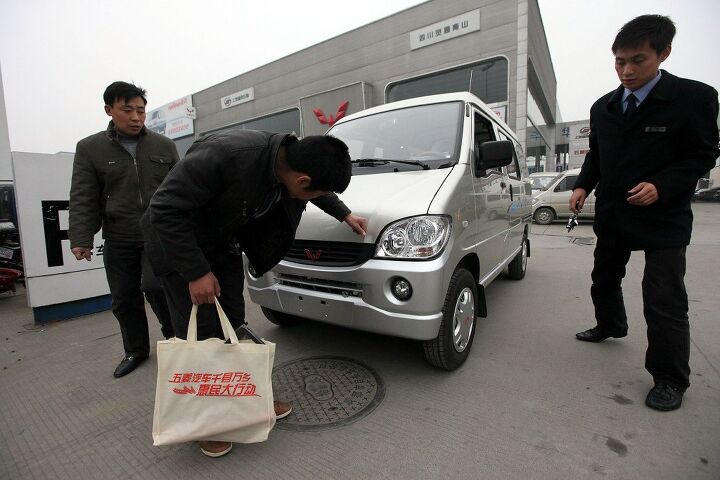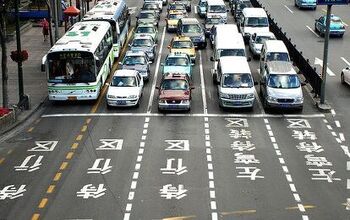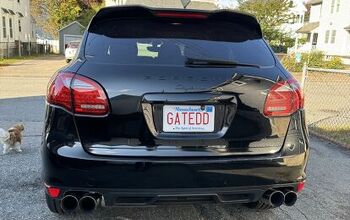China: 18 Million Cars. Now What?

From RenCen to Wolfsburg, all eyes are on China. Ok, so this year China will build and buy 18 million cars or thereabouts. But what about next year? Carmakers in Europe, Japan, and the U.S. are dependent on the Chinese growth machine. So what will it be? Boom or bust?
Already rattled by Beijing’s curb on new cars, stocks of German carmakers from BMW to Volkswagen took a nose-dive two days ago when the Chinese government announced that there will be no more tax incentives for new cars as of January 1, 2011. Well, not everybody at the German stock exchanges reads TTAC. If they would, the tax story would have not surprised them. The GM share (of a company with by far the most exposure to China) powered ahead. We have many readers at GM.
Well, the next day, the market realized that German automakers will be unhurt, and stocks recovered. Duh: If the tax hike hurts anybody, then it’s the (quasi) independents, such as Geely, Chery, or BYD. Why? The raised tax applies to cars of 1.6 liter and less. That’s not the playground of the big joint ventures.
And in any case: In 2009, the tax on cars 1.6 liters and less had been halved to 5 percent. January 1, 2010, the tax was raised to 7.5 percent. There were warnings of falling skies. China’s CAAM prognosticated moderate growth of 10 percent. Even TTAC was too conservative when we predicted 12 months ago that “China should close out 2010 with 15m, 16m, or more cars sold.”
And what did Chinese do? They listened neither to the CAAM, nor did they read TTAC, and they bought more cars in 2010 than any country on the globe, ever. So now the tax goes up from 7.5 percent to 10 percent. What’s 2.5 percent on a $5,000 car? $125. Big deal.
The Chinese government certainly didn’t suffer from the reduced taxes. While car sales rose some 30 percent this year “tax revenues from newly purchased autos jumped 53.3 percent from one year earlier to 156.92 billion yuan (23.77 billion U.S. dollars) in the first 11 months of 2010,” says Xinhua. Looks like more appetite for bigger cars anyway.
All eyes are on China, but not all see the same. The New York Times found a lawyer in Guangzhou who had plunked down $7,500 as a down payment on a $72,000 (incl. taxes) and who’s still waiting for his car, because Audi can’t keep up with the demand. Or because dealers sell the hot import at a premium over MSRP for immediate delivery.
There are others, such as USA Today, that see the Chinese market implode, “and that could eventually mean a flood of Chinese car imports into the U.S.” The yellow hordes, led by the Chevy Sail, no doubt. Don’t hold your breath.
Chinese automakers, from General Motors to Geely, think that “growing demand for cars in China will outweigh the impact from the end of tax incentives that boosted sales,” says Bloomberg. Pretty much all industry insiders in China agree with GM China’s Kevin Wale who expects the Chinese market to rise by 10 to 15 percent in the new year. Yesterday, Bloomberg called GM China and asked whether Wale had changed his mind. The answer was no.
Geely, maker of the QQ midgetmobile, is likewise optimistic. Lawrence Ang, Geely’s executive director, told Bloomberg that there is a loophole in the tax code. Fuel efficient cars still are sponsored by a 3,000 yuan ($450) subsidy, and “after some modifications, most small cars in China should be able to qualify.”
My take? A very simple one: There are anywhere between 1.3 billion and 1.5 billion (nobody really knows) people in China. Only 6 percent own a car. The rest wants one. Combine that with rising incomes, even for the lowly farmhand, and there are enough car buyers for decades to come. Sure, there will be the inevitable ups and downs, but the long term trend is up. (If there ever is a serious market tremor in China, it could bring GM down. Ford and Chrysler – if still alive- would gain.)
And to save you the typing of “housing bubble” – sure, there is one. Has been here for years. Is getting bigger by the day. Vacancy rates ginormous (nobody has real numbers.) However, in China you have to put down 30 percent for the mortgage on your first home. 50 percent for the second. All cash from here on out. There is no securitization of mortgages. A lot of the empty homes and mansions are paid for in full. If the real estate bubble pops (and it will,) there will be a giant redistribution of wealth. Isn’t that what communism is all about? ( Recommended reading here.)

Bertel Schmitt comes back to journalism after taking a 35 year break in advertising and marketing. He ran and owned advertising agencies in Duesseldorf, Germany, and New York City. Volkswagen A.G. was Bertel's most important corporate account. Schmitt's advertising and marketing career touched many corners of the industry with a special focus on automotive products and services. Since 2004, he lives in Japan and China with his wife <a href="http://www.tomokoandbertel.com"> Tomoko </a>. Bertel Schmitt is a founding board member of the <a href="http://www.offshoresuperseries.com"> Offshore Super Series </a>, an American offshore powerboat racing organization. He is co-owner of the racing team Typhoon.
More by Bertel Schmitt
Latest Car Reviews
Read moreLatest Product Reviews
Read moreRecent Comments
- SCE to AUX My son cross-shopped the RAV4 and Model Y, then bought the Y. To their surprise, they hated the RAV4.
- SCE to AUX I'm already driving the cheap EV (19 Ioniq EV).$30k MSRP in late 2018, $23k after subsidy at lease (no tax hassle)$549/year insurance$40 in electricity to drive 1000 miles/month66k miles, no range lossAffordable 16" tiresVirtually no maintenance expensesHyundai (for example) has dramatically cut prices on their EVs, so you can get a 361-mile Ioniq 6 in the high 30s right now.But ask me if I'd go to the Subaru brand if one was affordable, and the answer is no.
- David Murilee Martin, These Toyota Vans were absolute garbage. As the labor even basic service cost 400% as much as servicing a VW Vanagon or American minivan. A skilled Toyota tech would take about 2.5 hours just to change the air cleaner. Also they also broke often, as they overheated and warped the engine and boiled the automatic transmission...
- Marcr My wife and I mostly work from home (or use public transit), the kid is grown, and we no longer do road trips of more than 150 miles or so. Our one car mostly gets used for local errands and the occasional airport pickup. The first non-Tesla, non-Mini, non-Fiat, non-Kia/Hyundai, non-GM (I do have my biases) small fun-to-drive hatchback EV with 200+ mile range, instrument display behind the wheel where it belongs and actual knobs for oft-used functions for under $35K will get our money. What we really want is a proper 21st century equivalent of the original Honda Civic. The Volvo EX30 is close and may end up being the compromise choice.
- Mebgardner I test drove a 2023 2.5 Rav4 last year. I passed on it because it was a very noisy interior, and handled poorly on uneven pavement (filled potholes), which Tucson has many. Very little acoustic padding mean you talk loudly above 55 mph. The forums were also talking about how the roof leaks from not properly sealed roof rack holes, and door windows leaking into the lower door interior. I did not stick around to find out if all that was true. No talk about engine troubles though, this is new info to me.


































Comments
Join the conversation
Boom!!!11!1!1. 22 million or more next year.